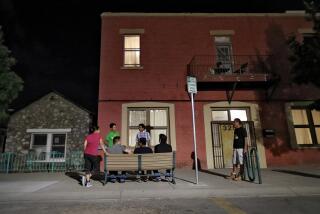Contempt of Court Claim Denied : Jail Rejected for Nancy Hoover Hunter
- Share via
A federal judge Monday rejected a request by prosecutors that he penalize Nancy Hoover Hunter for traveling outside the state without court permission, apparently believing that Hunter did not realize such authorization was necessary.
Assistant U.S. Atty. Gay Hugo had sought to have Hunter found in contempt of court and jailed for violating conditions of her bond by traveling out of state twice in the last year without first obtaining a judge’s consent.
Instead, U.S. District Judge Earl B. Gilliam imposed a suspended fine of $400 and ordered Hunter to observe the requirement if she plans future trips. Although he offered no explanation, Gilliam apparently was swayed by Hunter’s attorney, who said he had incorrectly advised his client that she did not need permission to leave the state.
Trial Next Year
Hunter, 48, is scheduled to go on trial early next year on charges stemming from her role in the 1984 bankruptcy of a La Jolla investment firm where she worked that was run by her former boyfriend, J. David (Jerry) Dominelli. She is charged with 234 counts of conspiracy to commit fraud, mail fraud, making false statements to a federal agency, fraud by a commodity pool operation and income tax evasion.
Dominelli is serving a 20-year term in federal prison. Hunter has remarried and lives in Santa Barbara with her husband, Kenneth, a wealthy businessman.
Citing the terms of a bond agreement signed by Hunter in November, 1986, Hugo attempted to persuade Gilliam that Hunter had knowingly violated the court’s order when she traveled to the Caribbean in December and to Kenya more recently.
“It is the government’s position that the defendant . . . knew that a condition of her release in this matter was that she was not to leave the state of California,” Hugo said. “She is at the very least in contempt of court.”
Arguing that Hunter failed to get court clearance to vacation because “she believes she is above the law and doesn’t need permission to travel,” Hugo asked Gilliam to jail Hunter briefly “to get her attention.” A fine, Hugo argued, would have little effect “on a woman in her financial situation.”
The prosecutor also requested that Hunter be required to surrender her passport, report in person to a court official each week and limit her travels to the central and southern federal court districts.
Hunter’s attorney, Richard Marmaro, called such a punishment “excessive” and said that the issue had been “blown entirely out of proportion.”
“The biggest reason that (Hugo’s request) is inappropriate is that (Hunter) didn’t make a mistake here, I did,” Marmaro said. The attorney explained that because he did not hear the federal magistrate say anything about travel restrictions when the terms of Hunter’s bond were set a year ago, he was unaware of any such limitations.
“I attended the bond hearing, I listened very carefully and all I heard was the $100,000 (in bail Hunter was required to pay),” Marmaro said. “I confess I did not read the small print, a mistake I will never make again.”
In any event, Marmaro said that Hunter in the past has demonstrated her willingness to abide by court rules. She obtained permission to travel several times during a related case heard in San Diego County Superior Court, Marmaro said.
More to Read
Sign up for Essential California
The most important California stories and recommendations in your inbox every morning.
You may occasionally receive promotional content from the Los Angeles Times.









